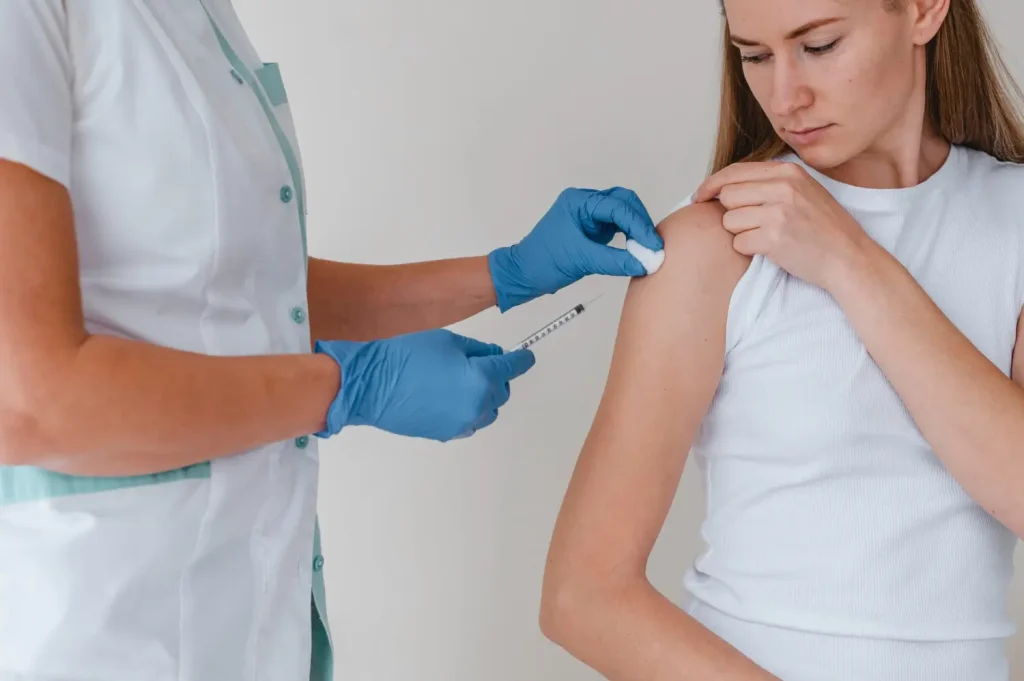Infertility affects approximately one in six individuals worldwide, with 13.4% of women struggling to conceive or carry a pregnancy to term. While a range of factors can contribute to infertility, including age, hormonal imbalances, and underlying health conditions, one area of concern for many is the long-term impact of contraceptive methods on fertility.
The Depo Shot, or Depo-Provera, is a widely used progestin-based injection that effectively prevents pregnancy by suppressing ovulation. However, its use has raised concerns among some women about its potential link to infertility, particularly due to the delay in menstrual recovery after discontinuation. These concerns have fueled misconceptions about its lasting effects on fertility.
In this article, we’ll dive into the scientific evidence surrounding Depo-Provera, examining how it affects ovulation and fertility, and address whether these concerns are warranted.
Key Takeaways
- Depo-Provera is a progestin-based contraceptive that suppresses ovulation, thickens cervical mucus, and thins the uterine lining to prevent pregnancy.
- Fertility recovery after stopping Depo-Provera can take 6 to 18 months, with variations based on age, duration of use, and overall reproductive health.
- While menstrual irregularities such as delayed periods and spotting are common, ovulation may resume before menstruation becomes regular again, meaning pregnancy is still possible.
- No permanent infertility is linked to Depo-Provera, and most individuals regain fertility within a few months after discontinuation. Studies show that the effects on ovulation are temporary.
- Healthcare providers recommend stopping Depo-Provera at least a year before attempting pregnancy to allow for proper cycle recovery.
- Proper counseling is essential for managing patient expectations, offering realistic timelines, and discussing alternative birth control methods for those wanting to conceive sooner.
About: Medical Spa RX provides medical practices with premium products at the best prices. If you’re looking to buy Depo-Provera for your practice, the sales representatives at Medical Spa RX can give you guidance.
How Depo-Provera Affects Ovulation and Cycle Recovery
Depo-Provera, a progestin-based contraceptive injection, works primarily by suppressing ovulation, preventing the ovaries from releasing an egg. It also thickens cervical mucus and thins the uterine lining, making pregnancy less likely. While highly effective, Depo-Provera’s impact on the menstrual cycle can extend even after the injection is discontinued.
Many individuals experience a delayed cycle recovery following discontinuation, which can cause concern. Menstrual irregularities, such as prolonged spotting or the absence of periods, are common. Although fertility generally returns over time, the recovery timeline varies. This means individuals may need patience if planning to conceive. Consulting a healthcare provider can help manage expectations and facilitate a smoother cycle recovery.
Typical Timeframe for Return to Fertility After Depo-Provera
A significant concern for Depo-Provera users is the timing of fertility return after stopping the shot. According to medical studies and clinical observations, it typically takes anywhere from 6 to 12 months for fertility to return. For some, it may take as long as 18 months, especially if the shot was used over a long period. Several factors affect this timeframe, including:

- Age of the user
- Duration of Depo use
- Overall reproductive health
- Frequency and regularity of previous menstrual cycles
It’s essential to understand that even if menstrual periods haven’t resumed, ovulation can begin before menstruation starts again. This means pregnancy can occur before the cycle becomes regular.
While patience is key, delayed fertility doesn’t necessarily equate to infertility. Most users regain full fertility over time, and conception is certainly possible once ovulation returns.
No Evidence of Permanent Infertility From Depo-Provera
Depo-Provera does not cause permanent infertility. Studies indicate that while some individuals may experience a delay in fertility return after stopping Depo-Provera, the effect is temporary. According to research, fertility typically resumes within months to a year after discontinuation, depending on individual health factors.
The delay in conception is primarily due to the time it takes for hormonal levels to return to normal after cessation. Understanding this can reassure users that Depo-Provera is a reversible contraceptive choice rather than a permanent barrier to fertility.
Counseling Patients About Fertility Planning While Using Depo-Provera
Proper counseling is essential when discussing how to give a Depo shot and its effects with patients who may want to conceive in the future. Since the return to fertility can take some time, early planning is crucial to avoid unnecessary stress and misinterpretation. Discussing clear expectations can ease concerns, especially when patients are unsure about the potential delays.

Points to Cover During Counseling
- Realistic Timeline: Inform patients it may take a few months for fertility to return.
- Alternative Options: Discuss other birth control options if pregnancy is desired within a year.
- Tracking Fertility Signs: Recommend using ovulation tests or fertility apps once periods resume.
- Healthcare Monitoring: Encourage regular follow-up visits to monitor cycle recovery.
- Nutritional and Lifestyle Guidance: Emphasize overall health to support reproductive hormone balance.
- Fertility Testing: If fertility hasn’t returned after 18 months, consider further evaluation.
By setting clear expectations and offering consistent, supportive guidance, healthcare providers can help reduce anxiety about conception after Depo-Provera use.
Conclusion
Depo-Provera is a highly effective contraceptive that works by temporarily halting ovulation. While it can cause a delay in the return of regular menstrual cycles and fertility, these effects are not permanent. Most users regain their ability to conceive within a year of stopping the injection. Although the delay in fertility for some women can lead to confusion and fear of infertility, scientific evidence does not support these fears.
Clear communication, early planning, and medical support are essential for women who wish to conceive after discontinuing Depo-Provera. While patience is required, the vast majority of women eventually regain their fertility without complications.
FAQs
1. How often do I need to get the Depo shot?
You need a new injection every 12 weeks (approximately every 3 months) to maintain effectiveness.
2. How effective is Depo-Provera at preventing pregnancy?
When used correctly, it is over 99% effective at preventing pregnancy.
3. Can I get pregnant while using Depo-Provera?
Pregnancy is highly unlikely if the shot is taken on time, but rare cases have occurred.
4. What are the common side effects of the Depo shot?
Side effects may include weight gain, irregular bleeding, mood changes, and delayed return of fertility.
5. Does Depo-Provera protect against STDs?
No, it does not. You’ll still need to use condoms to reduce the risk of sexually transmitted infections.
6. Can I stop using Depo-Provera at any time?
Yes, you can stop anytime. However, its effects may last in your body for several months afterward.
7. Is there an age limit for using Depo-Provera?
There’s no strict age limit, but long-term use in young women may impact bone density and should be monitored.
References
World Health Organization. Infertility Prevalence Estimates, 1990–2021. www.who.int. Published April 3, 2023. https://www.who.int/publications/i/item/978920068315
Depot Medroxyprogesterone Acetate (DMPA) Injections: An Intermediate Option SEXUAL HEALTH PREGNANCY and REPRODUCTIVE HEALTH. https://bpac.org.nz/2021/contraception/docs/depot.pdf





















